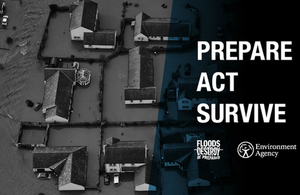Young people most at risk in a flood, warns Environment Agency & British Red Cross
The Environment Agency and British Red Cross research shows that young people most at risk in a flood

Flood campaign image
Young people most at risk in a flood, warns Environment Agency & British Red Cross
- 18-34s least aware of dangers of flooding in their area
- More than half of 18-34s would not know what to do in an emergency
- Mental health impacts of flooding can last for two years or more
The Environment Agency and British Red Cross are urging young people to learn how to protect themselves and help their communities when flooding hits after research shows a lack of knowledge is putting them at risk.
According to Environment Agency research, 18-34 year olds are least likely to know if the area where they live is at risk of flooding and least likely to know how to protect their homes and possessions. Less than half (48%) of under 35s would know what to do if a flood warning was issued.
This week, the government published new climate change projections which show that sea levels are set to rise over this century and more frequent, extreme weather requires urgent action. This means that knowing your flood risk and understanding what action to take in a flood is more important than ever.
5.2 million homes and businesses in England are at risk of flooding and the average cost of flood damage to a home is £30,000 but the devastating consequences can go beyond the material. Those who experience flooding in their own home are also at high risk of suffering from negative mental health impacts which can last for years after flooding has hit. The most recent Public Health England research shows that over a third of people who were flooded in 2014 suffered with depression, anxiety or PTSD and nearly a quarter of people were still experiencing these negative mental health impacts two years later.
In December 2015, Storm Desmond struck North West England and caused extensive flooding, leaving 45,000 homes without power. Thousands of properties in Cumbria were flooded including a church in Kendal where local resident, Jonny Gios still works. He said:
Being flooded turned our world upside down for a whole year. The community came together in an amazing way during the recovery process but the stress and worry in the months that followed was devastating. It was difficult to unpack the trauma and took several months of counselling – suffering physical and emotional symptoms of post-traumatic stress.
I can’t underline how important it is to be prepared and to know what to do when flooding hits. Simple actions can make a huge difference and could save you months of trying to gather your life and home back together.
The Environment Agency has today launched its Flood Action Campaign, partnering with the Red Cross, to encourage young people to learn how to Prepare Act Survive in a flood to reduce the impacts of damage, and to join a new national network of Community Reserve Volunteers to help their communities if disaster strikes.
Caroline Douglass, Director of Incident Management & Resilience at the Environment Agency said:
The terrible impacts of flooding can last long after the flood waters have receded. But simple actions can lessen the damage to your home, protect your wellbeing and help you recover more quickly.
Our flood defences protect thousands of homes around the country but we can never entirely eliminate the risk of flooding, which is why it’s crucial to know how to protect yourself when it hits.
Simon Lewis, Head of Emergency Response at the British Red Cross, said:
We respond to an emergency every four hours in the UK, from major fires to devastating floods. Flooding can have a catastrophic impact on homes and communities, causing untold damage to the things and the people we treasure most. That’s why it’s vital we all know what to do, and how to help, to lessen the impact and help communities rebuild and recover faster.
Sadly we cannot always stop things like this from happening, but by becoming a community reserve volunteer, young people across the UK could help make a difference should the worst happen.
The British Red Cross wants to create a national network of 10,000 community reserve volunteers who can be called upon to help in a crisis. Over 5,000 people have already signed up to the scheme so far.
To be a community reserve volunteer you don’t need specialist skills to make a difference and simple acts of kindness can make big difference. Any necessary training will be given at the scene of the crisis and you can confirm your availability when you are contacted. With these two initiatives the Environment Agency and the Red Cross want to see younger people not only better prepared for flooding but also more actively involved in supporting the community in times of need.
The Environment Agency is spending more than £2.6 billion to build flood schemes around the country as part of its current programme, which will better protect 300,000 homes by 2021.